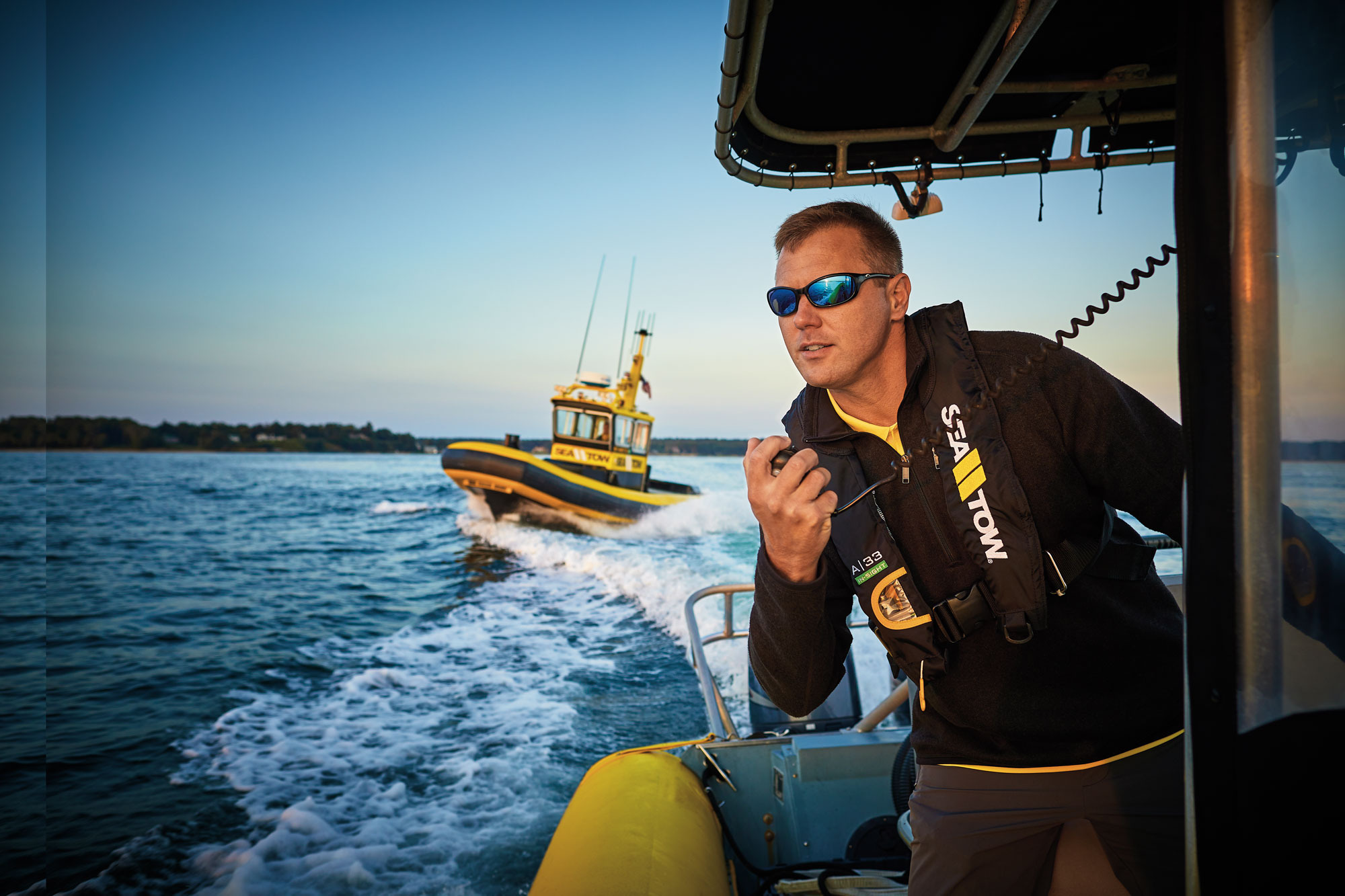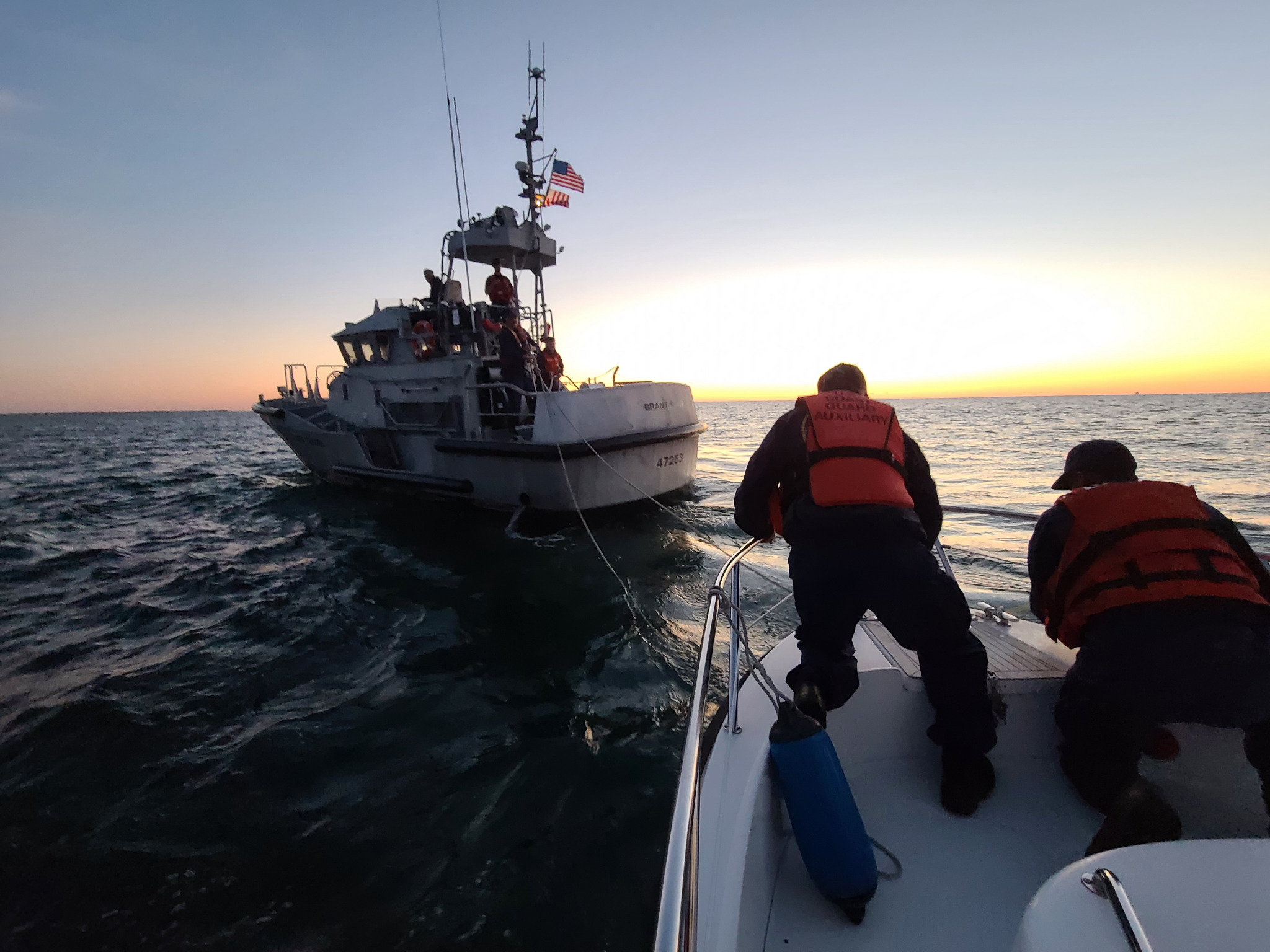
Seafaring Saviours
~~ Cape Cod Life Magazine
Although this feature begins with a big-fish story, it’s not that kind of a big-fish story. In this tale, the fish was actually big – an 83-inch, 300-pound bluefin tuna – and it never got away. Soon after sport fisherman Andy Centauro, his wife and cousin secured the big tuna, however, they were fortunate to escape with their lives when their boat, the Reel Quick, nearly capsized on the way back to Nantucket.
“We were about 35 miles east of Great Point Light on Nantucket, near the Regal Sword shipwreck, and we had managed to get the tuna on ice on the deck,” recalls the retired Centauro, a lifelong boater and U.S. Coast Guard-certified captain. “We were on our way back to Nantucket at about 10-12 knots [about 12-14 miles an hour] when the front of the boat suddenly flew up in the air. You could hear the rumble, rumble, rumble of the propellors and then the boat keeled portside. Once I brought the boat up, we realized that we had hit some sort of submerged object.”
After stabilizing the boat, Centauro inspected the damage and determined that the 35-foot Reel Quick remained seaworthy and safe. Hoping that they could limp back to Nantucket, and then to their home port in Falmouth, Centauro put the boat back into gear, only to discover that the Reel Quick was unable to exceed eight knots without violently vibrating.
“We had a dilemma because we were about 70 miles from Falmouth,” adds Centauro. “We had life jackets as well as a raft on board, but we also had to worry about our propellor-drive shaft cracking and potentially sinking in 40-degree waters.”
U.S. Coast Guard Auxiliary, Sea Tow and TowBoatU.S. provide maritime-support services for the region.
The ocean is a great equalizer . . . Even experienced boaters can have an unlucky cloud following them around on a given day, so we’re not just providing our customers with a tow or other assistance; we’re really offering them peace of mind."
Longstanding Tradition of Maritime Assisstance
So Centauro placed a call to Sea Tow Cape Cod and Islands, one of the region’s maritime-assistance services, and Captain/Owner Ramsey Chason immediately sent a boat from Hyannis to meet Centauro en route to Nantucket. Once an assessment was performed, a larger vessel, equipped to handle big boats, was dispatched to conduct an escort and be available in case conditions worsened.
“Ramsey also sent a big boat from Newport [R.I.], which had to run through Buzzard’s Bay, Vineyard Sound and then Nantucket Sound just to get to us and escort us home,” says Centauro, who made it to Falmouth, slowly, under his own power. “I can never thank Ramsey enough; he really came through.”
Chason, who has an extensive background in the sport-fishing and environmental services industries, first earned his captain’s license while attending the College of Charleston in South Carolina. While working his way through undergraduate and graduate school, Chason spent years piloting sport-fishing vessels throughout the Atlantic and the Caribbean.
“The ocean is a great equalizer, so we get calls from people of all experience levels,” says Chason. “Faulty mechanical components don’t care who’s standing behind the wheel.
“Even experienced boaters can have an unlucky cloud following them around on a given day,” adds Chason. “So we’re not just providing our customers with a tow or other assistance; we’re really offering them peace of mind.”
Residents of Cape Cod and the islands have a proud, long-standing tradition of providing maritime assistance to seafarers of all stripes. According to the recently published book, Shipwrecks of Cape Cod, by Don Wilding, the surfmen of the United States Life-Saving Service began patrolling Cape Cod’s untamed outer beaches in 1872, and this practice continued after the Life-Saving Service and Alexander Hamilton’s Revenue Cutter Service (1790) merged to form the United States Coast Guard in 1915.
In the 21st century, the mantle of providing maritime assistance for Cape Cod and the Islands rests upon the collective shoulders of the United States Coast Guard District 1 and the U.S. Coast Guard Auxiliary Division 11, as well as private, licensed maritime-assistance operators like TowBoatU.S./Cape Cod and Sea Tow/Cape Cod and Islands. The active-duty Coast Guard oversees and regulates the activities of the auxiliary and private operators, which also aid the Coast Guard with search-and-rescue support when needed.
Current law and guidelines dictate that the active-duty U.S. Coast Guard handles all distress calls that may endanger life – boats capsizing or sinking, vessel fires, etc. – while the Coast Guard Auxiliary, Sea Tow and TowBoatU.S. handle all non-distress calls. “A lot of people think of us as the ‘Triple-A’ of the waterways,” says Shawn Brule, a 22-year Coast Guard veteran and owner of TowBoatU.S./Cape Cod.
It wasn’t always this way. For the first seven decades after the 1915 merger, the U.S. Coast Guard handled all boating-distress calls on U.S. waterways. But that changed when recreational boating activity began to explode in the 1970s and 1980s.
“During this time, the Coast Guard was overwhelmed with non-emergency requests for assistance,” says Brule. “This became a serious problem if a Coast Guard vessel was servicing a minor issue, and this prevented the crew from responding to a subsequent critical distress call in a nearby harbor.”
As a result, the U.S. Congress enacted legislation in the 1980s that directed the active-duty Coast Guard to hand off non-distress incidents to the Coast Guard Auxiliary, which is staffed by civilian volunteers, and private companies.
“Ultimately, we all have the same shared goal of protecting mariners, which translates to saving lives, protecting property and protecting the environment,” says Chief Warrant Officer Elijah Reynolds of the U.S. Coast Guard’s First District, which stretches from Maine to Northern New Jersey. “With the auxiliary and private businesses handling the non-distress calls, that enables the active-duty Coast Guard to handle more critical maritime emergencies and missions.”
Preventive Maintenance
While the Coast Guard Auxiliary, TowBoatU.S. and Sea Tow all offer similar services – towing, fuel drop-off, battery jump-starts, mechanical support, soft ungrounding assistance, salvage operations and environmental clean-up, to name a few – one of their most important missions is maritime-safety education. This is especially important in a state like Massachusetts, where no boater’s or driver’s license is required to pilot a boat.
Although Sea Tow and TowBoatU.S. offer safety courses for their members and the public, it’s the Coast Guard Auxiliary that dedicates the most time and effort to boating-safety initiatives, including public-education outreach and routine vessel-inspection services.
While the region’s maritime authorities have always appreciated the auxiliary’s safety-education efforts, they might not have fully understood the true value of these proactive initiatives until the pandemic struck. According to Officer Reynolds, who grew up in Chatham, Division 1’s safety statistics from this time paint a sobering scenario.
When the First District’s Coast Guard Auxiliary was ordered to “stand down” from 2019-’20, the public-safety course completion rate plunged by 81% and safety checks plummeted by 93%. Combine this with increased boating activity at the height of the pandemic, and the maritime fatality rate skyrocketed by an astonishing 67%.
“Our basic mission is to provide safety for the boating public, and a critical component of this goal is boater education,” says retired teacher and lawyer Bruce Brady, who now serves as commander of Cape Cod’s U.S. Coast Guard Auxiliary Division 11. “We teach people how to operate boats safely, we conduct routine vessel-safety inspections and we also serve as the eyes and ears of the Coast Guard with our local on-water activities.”
TowBoatU.S. Cape Cod and Sea Tow also do their part. Both companies’ boat captains, who conduct routine patrols during peak season, are U.S. Coast Guard-certified. Brule’s TowBoatU.S. provides a life-jacket loaner program on the Onset Town Pier and other locations, as well as a variety of online and in-person training opportunities. Chason, with Sea Tow, offers clients a variety of training sessions, free escorts through the treacherous Woods Hole Passage and assists many customers in plotting courses to Florida each fall.
The ‘Road Signs’ of the Waterways
While Sea Tow offers escorts through the Woods Hole Passage, what makes those journeys possible are the thousands of federal and private “aids to navigation” (ATONs) – the “road signs” of the waterways – that dot the waters around the Cape and Islands. These buoys, day beacons, channel markers, lighthouses, fog signals, etc., provide safe passage through often dangerous waterways.
While the Coast Guard’s active-duty ATON team, based out of Woods Hole, verifies the 300-350 federal ATONs around Cape Cod, the region’s remaining private ATONs are left to be verified by the auxiliary. “If our auxiliary can't verify these thousands of private ATONs, it falls on active-duty Coast Guard to do the work,” says Officer Reynolds. “In my opinion, the auxiliary really earns its keep by verifying these ATONs for us.”

But even when you follow these aquatic road signs, as Mashpee’s Howard Flitts regularly does, an unlucky cloud can still manifest overhead. Prior to the pandemic, Flitts was taking his wife, Laurie, pregnant daughter, Adena, and their three-year-old grandson, Benny, out for a pleasure cruise through Vineyard Sound when their boat’s piercing alarm shrieked to life as the quartet detected a slight burning smell. A call to Sea Tow brought Chason and his team to the scene, and they managed to tow the boat in while calming young Benny’s nerves.
“Benny was probably young enough to not understand what was going on, but old enough to know that grandpa was a little stressed out,” recalls Chason. “So when I went to next New England Boat Show in Boston, all of a sudden a tiny little guy – Benny – runs up and hugs my leg.
“Then Mr. Flitt, his grandfather, comes up and tells me that Benny ‘hasn't stopped talking about you since you helped us,’” adds Chason. “It was a really cool experience because it shows the positive impact that the quick and efficient provision of professional service can have on little kids, who can be scared off from boating with one bad experience on the water.”




Post a comment